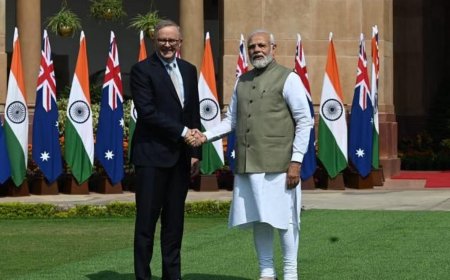Australia's New Visa Rules Aim to Protect Long-Term Residents | Australia Immigration News
Labor is standing by ‘ministerial direction 99’ despite cases that seem to contradict the advice given in early 2023. A rule change designed to consider a non-citizen’s ties to Australia before cancelling their visa was aimed at people without “serious offending or family violence,” the immigration minister was advised early in 2023.
However, reports of some non-citizens with criminal histories having their visas restored seem to contradict the intention behind that advice to Andrew Giles, prompting the Coalition to pledge it will repeal the new rules if elected.
Documents released under freedom of information laws reveal that the home affairs department conducted mock exercises to assess the potential outcomes of the rule change. The department concluded the change would “not have a substantive effect” on non-citizens convicted of more serious crimes.
The Albanese government is upholding the rule change – known as ministerial direction 99 – which was introduced to reflect a “commonsense” approach that people with significant ties to Australia should not be deported to countries where they lack community connections.
This agreement was reached between Anthony Albanese and then New Zealand prime minister, Jacinda Ardern, in July 2022, with Giles approving the change in January 2023.
Under the new rules, the strength, nature, and duration of ties to Australia are considered alongside four other “primary considerations,” including community protection and “whether the conduct engaged in constituted family violence.”
The department’s submission to Giles on 20 January 2023 indicated that the rules were “expected to benefit cases with relatively low sentence length.”
“Adverse decisions (e.g., not revoking visa cancellation) are more likely in cases involving serious offending or family violence, despite the person having resided in Australia for a considerable period,” the submission stated.
The department tested the likely impact of the new ministerial direction with a “desktop exercise” that reviewed a sample of visa cancellation decisions.
Out of eight visa cancellation decisions tested, only two were changed under the new rules, the FOI documents reveal. In these cases, the applicants “had relatively low sentence lengths (12 months and 18 months), had lived in Australia since childhood, and did not involve family violence.”
In three test cases involving long-term residents with serious offenses – a child sexual abuse offense, a murder, and “long-term recidivistic offending (some violent)” – the visa cancellation decisions were upheld.
However, in some cases decided by the independent administrative appeals tribunal since January 2023, ties to Australia have been a factor favoring the reversal of a visa cancellation.
For example, a New Zealand-born man, referred to as CHCY, had his visa reinstated in March despite being found guilty of nine counts of indecent treatment of a child under 16 and two counts of rape in relation to his stepdaughter.
The AAT “found that CHCY’s strength, nature, and duration of ties to Australia as a primary consideration, weigh in favor of revocation of his visa cancellation as he has lived here for 21 years.”
The Albanese government maintains that the rule change is intended to balance the consideration of individuals' ties to Australia with the need to protect the community, while the Coalition has criticized the approach and pledged to repeal it if elected.
What's Your Reaction?
 Like
0
Like
0
 Dislike
0
Dislike
0
 Love
0
Love
0
 Funny
0
Funny
0
 Angry
0
Angry
0
 Sad
0
Sad
0
 Wow
0
Wow
0









































































































